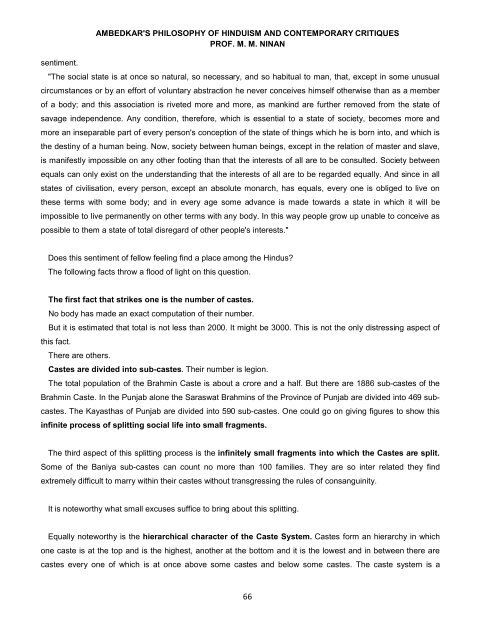Ambedkar-Philosophy of Hinduism
Create successful ePaper yourself
Turn your PDF publications into a flip-book with our unique Google optimized e-Paper software.
sentiment.<br />
AMBEDKAR'S PHILOSOPHY OF HINDUISM AND CONTEMPORARY CRITIQUES<br />
PROF. M. M. NINAN<br />
"The social state is at once so natural, so necessary, and so habitual to man, that, except in some unusual<br />
circumstances or by an effort <strong>of</strong> voluntary abstraction he never conceives himself otherwise than as a member<br />
<strong>of</strong> a body; and this association is riveted more and more, as mankind are further removed from the state <strong>of</strong><br />
savage independence. Any condition, therefore, which is essential to a state <strong>of</strong> society, becomes more and<br />
more an inseparable part <strong>of</strong> every person's conception <strong>of</strong> the state <strong>of</strong> things which he is born into, and which is<br />
the destiny <strong>of</strong> a human being. Now, society between human beings, except in the relation <strong>of</strong> master and slave,<br />
is manifestly impossible on any other footing than that the interests <strong>of</strong> all are to be consulted. Society between<br />
equals can only exist on the understanding that the interests <strong>of</strong> all are to be regarded equally. And since in all<br />
states <strong>of</strong> civilisation, every person, except an absolute monarch, has equals, every one is obliged to live on<br />
these terms with some body; and in every age some advance is made towards a state in which it will be<br />
impossible to live permanently on other terms with any body. In this way people grow up unable to conceive as<br />
possible to them a state <strong>of</strong> total disregard <strong>of</strong> other people's interests."<br />
Does this sentiment <strong>of</strong> fellow feeling find a place among the Hindus?<br />
The following facts throw a flood <strong>of</strong> light on this question.<br />
The first fact that strikes one is the number <strong>of</strong> castes.<br />
No body has made an exact computation <strong>of</strong> their number.<br />
But it is estimated that total is not less than 2000. It might be 3000. This is not the only distressing aspect <strong>of</strong><br />
this fact.<br />
There are others.<br />
Castes are divided into sub-castes. Their number is legion.<br />
The total population <strong>of</strong> the Brahmin Caste is about a crore and a half. But there are 1886 sub-castes <strong>of</strong> the<br />
Brahmin Caste. In the Punjab alone the Saraswat Brahmins <strong>of</strong> the Province <strong>of</strong> Punjab are divided into 469 subcastes.<br />
The Kayasthas <strong>of</strong> Punjab are divided into 590 sub-castes. One could go on giving figures to show this<br />
infinite process <strong>of</strong> splitting social life into small fragments.<br />
The third aspect <strong>of</strong> this splitting process is the infinitely small fragments into which the Castes are split.<br />
Some <strong>of</strong> the Baniya sub-castes can count no more than 100 families. They are so inter related they find<br />
extremely difficult to marry within their castes without transgressing the rules <strong>of</strong> consanguinity.<br />
It is noteworthy what small excuses suffice to bring about this splitting.<br />
Equally noteworthy is the hierarchical character <strong>of</strong> the Caste System. Castes form an hierarchy in which<br />
one caste is at the top and is the highest, another at the bottom and it is the lowest and in between there are<br />
castes every one <strong>of</strong> which is at once above some castes and below some castes. The caste system is a<br />
66


















